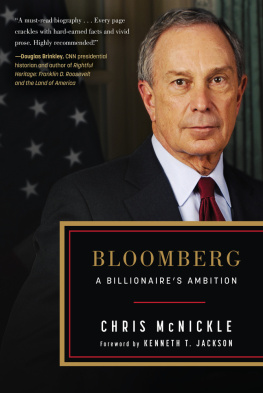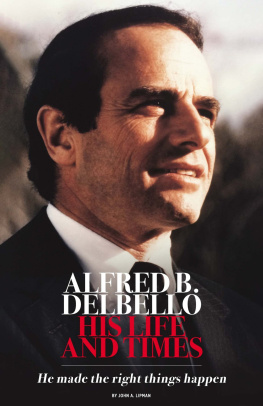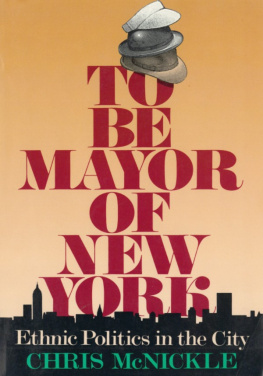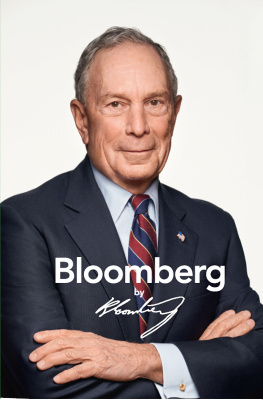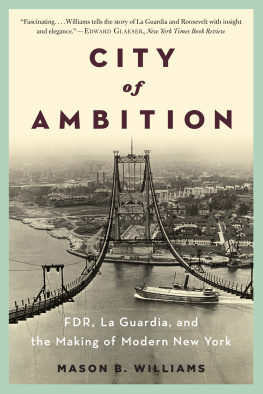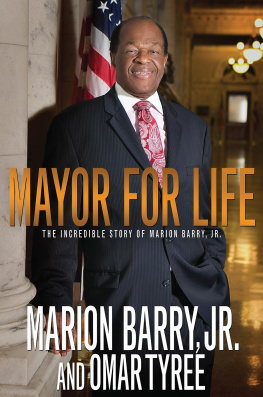Copyright 2017 by Chris McNickle
Foreword 2017 by Kenneth T. Jackson
All rights reserved. No part of this book may be reproduced in any manner without the express written consent of the publisher, except in the case of brief excerpts in critical reviews or articles. All inquiries should be addressed to Skyhorse Publishing, 307 West 36th Street, 11th Floor, New York, NY 10018.
Skyhorse Publishing books may be purchased in bulk at special discounts for sales promotion, corporate gifts, fund-raising, or educational purposes. Special editions can also be created to specifications. For details, contact the Special Sales Department, Skyhorse Publishing, 307 West 36th Street, 11th Floor, New York, NY 10018 or .
Skyhorse and Skyhorse Publishing are registered trademarks of Skyhorse Publishing, Inc., a Delaware corporation.
Visit our website at www.skyhorsepublishing.com.
10 9 8 7 6 5 4 3 2 1
Library of Congress Cataloging-in-Publication Data is available on file.
Cover design by Rain Saukas
Cover photo credit: New York City Municipal Archives
Print ISBN: 978-1-5107-2257-6
Ebook ISBN: 978-1-5107-2259-0
Printed in the United States of America
To Nick and Litna,
Danny and Ceci,
Katie and Becky
Acknowledgments
I have long had the good fortune to be friends with Mark Gallogly and Buddy Stein, who loyally read drafts of the manuscript for this book and shared good ideas for ways to make it better. Peter Cunningham, Charley Ellis, Joe and Mary Lynch, and Harvey Robins also read chapters or drafts and shared their insights. I am grateful for their help and lucky to have them as friends.
Many people involved with Michael Bloomberg, one way or another during the years he served as mayor, shared their precious time with me. I have listed their names in the sources section and I am grateful to them all. Howard Wolfson, Amanda Burden, Eduardo Castell, Fernando Ferrer, Linda Gibbs, Emily Mayrath, Seth Pinsky, Roberto Ramirez, and Marc Shaw were especially generous. None are accountable for the interpretations in this book, for which I alone am responsible.
At the City of New York Municipal Archives, Ken Cobb and Michael Lorenzini went out of their way to make my research easier, and at the City of New York Independent Budget Office, Doug Turetsky did the same. My agent, Erika Storella, worked diligently to find the right publisher, and Joseph Craig at Skyhorse guided the book into print. Frederik Bligaard, from a British Virgin Islands hilltop, tracked down a fact that a non-Danish speaker struggled to confirm. I thank them all for their help.
Fred Walters, who claims to have heard a live, real-time, audio version of the book since I recounted stories to him each day that I learned them, was a faithful companion throughout. Zack Stein and Alex Grimes, two talented young artists, one a playwright and the other a musician, graced our home at different times while I worked on the manuscript, and they cheered me on. The family members to whom this book is dedicated have been part of my New York life from the moment I entered the world in one case, and from the moment they did in three others. Two I met along the way when love and marriage brought them into our hearts. The constant love and support they all provide is beautiful.
Contents
Foreword
By Kenneth T. Jackson
New York, like America, is an idea. Russell Shorto captures this essential truth in The Island at the Center of the World: If what made America great was its ingenious openness to different cultures, the small triangle of land at the southern tip of Manhattan Island is the birthplace of that idea: This island city would become the first multiethnic, upwardly mobile society on Americas shores, a prototype of the kind of society that would be duplicated throughout the country and around the world. That is why New York matters so much more than other cities.
There have been 113 mayors of the great city at the mouth of the Hudson Riverif we include the four chief executives of the Dutch West India Company, which controlled New Amsterdam before the English conquered it in 1664 and renamed it New York. For centuries, the job was not onerous and until 1834 the holders of the office were appointed rather than elected. They served only for a year or two, ended their terms with nice dinners and congratulatory toasts, and, with minor exceptions, did not leave deep footprints on the city.
Mayors who served after the consolidation of the five boroughs into one enormous municipality in 1898 had a more substantial effect on the metropolis. By then, New York stretched over three hundred square miles and was the second largest city in the world, after London, which was centuries older. New Yorks harbor was the busiest anywhere and its buildings the tallest. City government built roads, bridges, subways, schools, parks, and fire stations. It hired policemen and teachers, and had an annual budget greater than any state in the nation. For much of the last century, only the federal government spent more. Running the city was no longer a part-time job, and in some ways, all of the mayors of New York in the twentieth century were important figures in history.
But some were more important than others. Fiorello H. La Guardia, often called the Great Mayor of New York, took office in the depths of the Great Depression, when the unemployment rate reached a horrific 25 percent. Makeshift shelters and homeless encampments dotted the landscape; bread and soup lines were common, as was the spectacle of men in suits and hats selling apples and pencils on street corners. Through self-confidence, hard work, force of will, and engaging personality, La Guardia created an atmosphere of hope. With Robert Moses, he attracted large federal grants to fund public improvements like the Triborough and Whitestone Bridges, the Henry Hudson and Northern State Parkways, and the renovation of Central Park. Their efforts employed tens of thousands of workers and helped the region recover from the worst financial crisis in its history. An airport, a college, a high school, and any number of institutions proudly wear La Guardias name in honor of his memory.
Edward I. Koch also inherited a municipality in distress. In 1977, when he claimed City Hall, New York was technically bankrupt. White flight had reduced the number of middle-class families by the tens of thousands year after year, while corporations decamped to the suburbs or other regions altogether. Poor migrants from the American South and Puerto Rico seeking opportunities in the big city took their place. Tax rolls declined, welfare rolls grew, and the municipal treasury could not fund its obligations. Drug use and crime grew rampant. Koch, a supremely self-confident community leader from Greenwich Village, responded with dozens of hard decisions, and by the end of his third term New York was on its way back to the top of the world urban hierarchy.
Rudolph W. Giuliani ascended to the citys top job in 1994. Crime was already going down, but Giuliani made safe streets the centerpiece of his administration and by 2001, when he left office, homicide rates and major crime had fallen to the lowest levels since accurate record-keeping began. The perception of the city improved across the region and across the nation.
But on January 1, 2002, the future of New York looked grim. Just three months earlier, the city had suffered the worst terrorist attack in world history when two giant airliners crashed into the North and South Towers of the World Trade Center. Each building was 110 stories tall, and together they contained more office space than many entire cities. In less than two hours, 2,749 people lost their lives. The tragic day was especially hard on first responders, who had rushed toward the danger even as tens of thousands of others were running away. Three hundred and forty-three firemen perished. Despite overwhelming odds, they entered the inferno and climbed as far as they could, some with almost a hundred pounds of equipment on their backs, in a desperate effort to rescue people. Sixteen million square feet of office space were obliterated and upward of a hundred thousand people no longer had a place to work. Billions of dollars in economic investment had been lost. Giant plumes of smoke and stark steel girders were all that remained of a place once teeming with activity.

